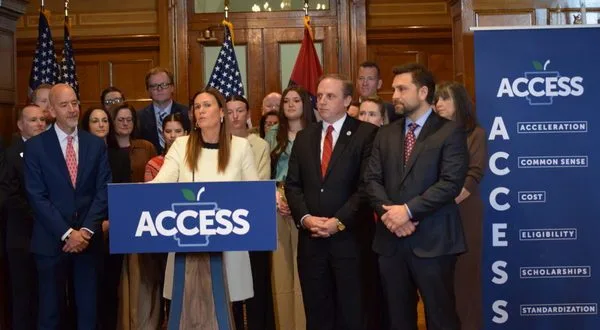
Gov. Sarah Huckabee Sanders announces details of the Arkansas ACCESS bill on Feb. 14, 2025. Education Sec. Jacob Oliva stands at left. Rep. Matthew Shepherd and Sen. Jonathan Dismang are at right. (Antoinette Grajeda/Arkansas Advocate)
Gov. Sarah Huckabee Sanders announced Friday that her anticipated higher education bill will address funding, diversity initiatives, admissions policies, scholarships and course credit. State lawmakers said they expect to file what will be a roughly 100-page bill Monday.
Arkansas ACCESS – which stands for acceleration, common sense, cost, eligibility, scholarships and standardization – mirrors Sanders’ strategy for making sweeping changes to K-12 education with one large bill in 2023 – the LEARNS Act.
Sen. Jonathan Dismang, R-Searcy, and Rep. Matthew Shepherd, R-El Dorado, are the lead sponsors of Arkansas ACCESS. New general revenue funds are not expected to be needed to support the bill’s initiatives, but officials will repurpose existing funds within the department to fund some of the projects, Sanders said during a press conference at the Capitol.
The goal of the legislation is to reduce the complexity in students’ path to higher education, she said.
“Higher education should be available to anyone who wants it, right after high school or many years down the line, and ACCESS will make that a reality,” Sanders said. “We will also get indoctrination out of higher education so students can learn in a free, unbiased setting.”
Among the bill’s “common sense” initiatives are provisions to stop the use of diversity, equity and inclusion (DEI) in accreditation standards, prohibit professors from “indoctrinating students with forced statements in support of DEI,” prevent schools from granting excused absences to attend protests and require students who vandalize property to pay damages before they can earn a degree, according to a press release.
A lawsuit challenging a section of the LEARNS Act banning indoctrination in K-12 schools resulted in a federal judge issuing a preliminary injunction last year. U.S. District Judge Lee Rudofsky wrote that teachers could discuss sensitive subjects, but could be disciplined if they compel students “to adopt, affirm, or profess a belief in a theory, ideology or idea.”
Compulsion requires speech or actions such as teachers threatening to grade students on the basis of whether they accept or reject a theory, Rudofsky said.
Education Secretary Jacob Oliva echoed similar language at Friday’s press conference, and said it’s professors’ jobs to engage in debate.
“You should argue multiple perspectives, multiple points of view. You should engage in critical thinking,” he said. “That’s what good teachers do. That’s what good professors do.”
Oliva has often said that high school students should have access to accelerated pathways. To that end, provisions in Arkansas ACCESS recommend standardizing weights for concurrent credit, and Advanced Placement and International Baccalaureate courses, and broadening college-level coursework beyond AP and IB courses, according to the press release.
Stakeholders are working to create a system that sets all Arkansans up for success, Oliva said. Because higher education isn’t standardized and coordinated currently, “we have unnecessary roadblocks and measures that discourage students and families from participating in prosperity, and we’re going to remove that,” he said.
To streamline the process and remove barriers, Arkansas ACCESS proposes expanding eligible admission exams, granting provisional admission to students who meet baseline admissions requirements, creating a statewide universal college application and offering in-state tuition to Arkansas military families. The bill would also standardize course numbers at all state-supported higher education institutions and increase the number of general education and career and technical education (CTE) courses in the Arkansas Course Transfer System.
To address financial barriers, the legislation recommends expanding the Workforce Challenge Scholarship opportunities to serve more students, according to a press release. It also would establish a scholarship for Medal of Honor and Purple Heart recipients, doubling the first-year Arkansas Academic Challenge award from $1,000 to $2,000, and establishing a scholarship program for disabled students.
Ultimately, the provisions of the bill are focused on students, Dismang said.
“We’re going to be looking and increasing the opportunities that they have before them, and then we’re going to be maximizing their outcomes so they can be as successful as they can possibly be,” he said.
Arkansas ACCESS will start the process of amending the productivity funding model for higher education institutions. Officials will consider return-on-investment “so that taxpayers are funding degrees that contribute to our state and to our economy,” Sanders said.
Officials will also create a funding model for non-degree credentials, “so that Arkansans can go to school for the skills they need, leave without too much debt and enter the workforce as soon as possible,” she said.
To view this story, or more news updates from Arkansas Advocate, click here.
WebReadyTM Powered by WireReady® NSI










